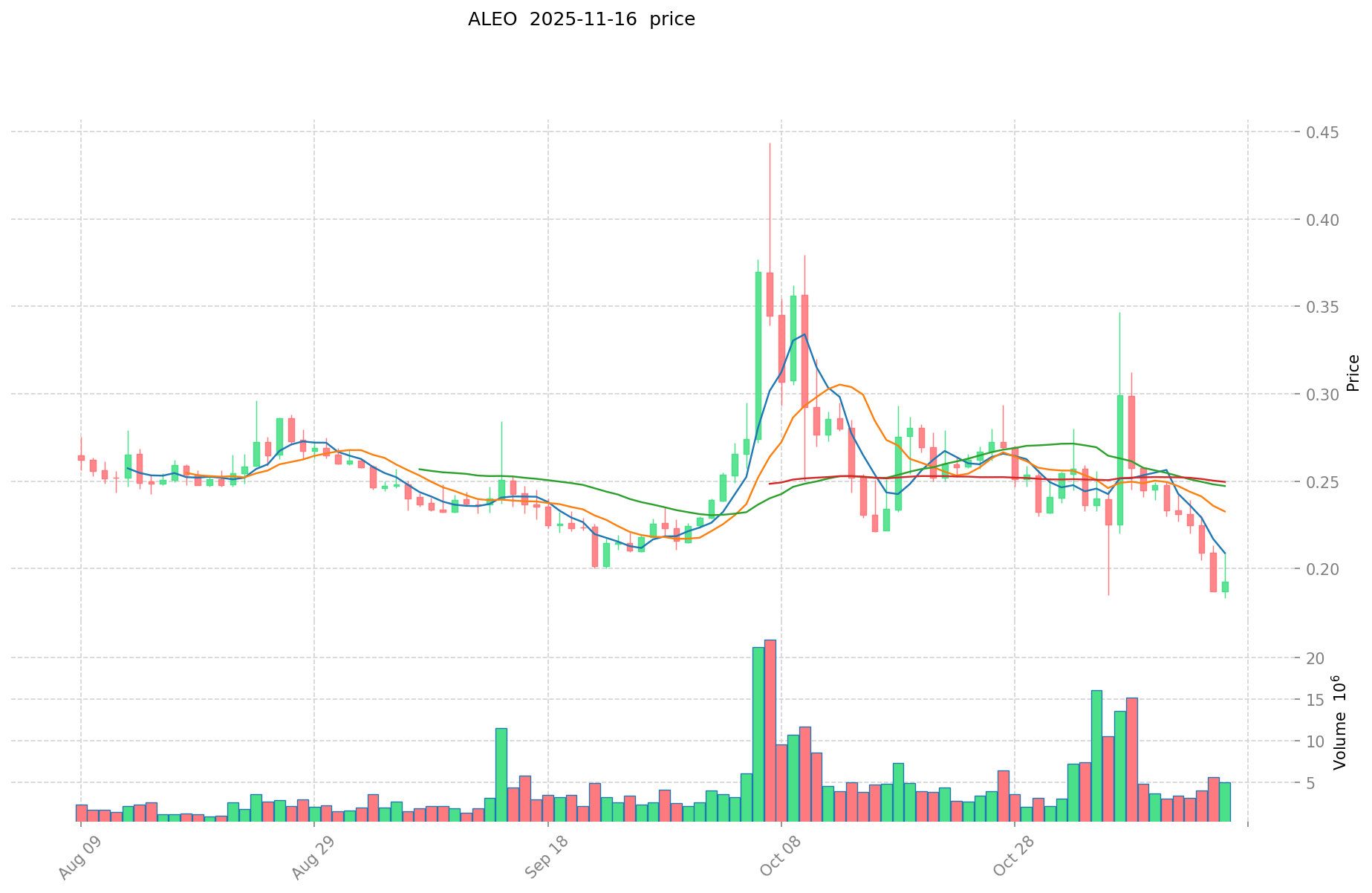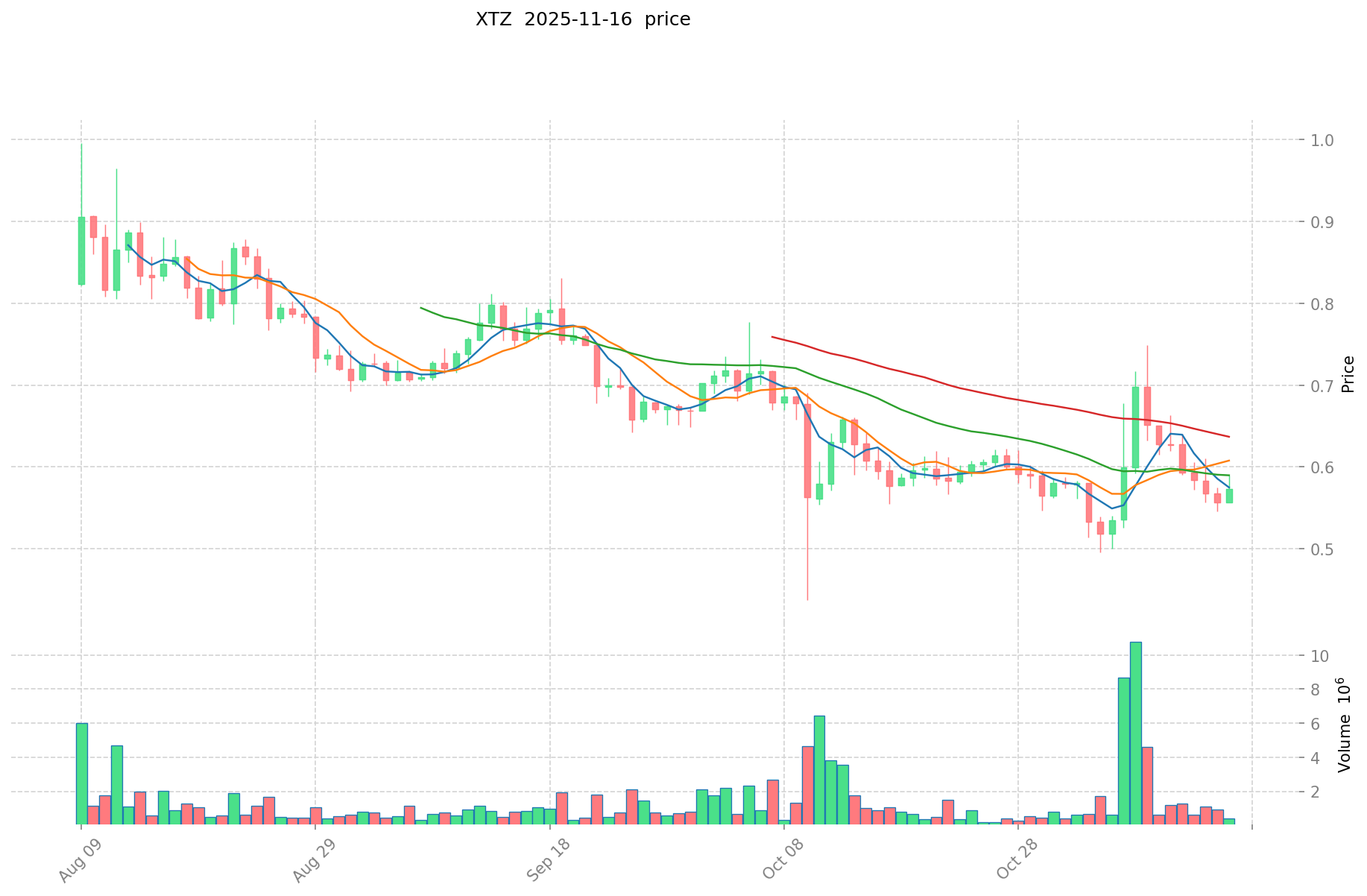ALEO vs XTZ: Comparing Two Promising Blockchain Platforms for Privacy and Scalability
Introduction: ALEO vs XTZ Investment Comparison
In the cryptocurrency market, the comparison between ALEO vs XTZ has always been an unavoidable topic for investors. The two not only show significant differences in market cap ranking, application scenarios, and price performance, but also represent different positions in crypto assets.
Aleo (ALEO): Since its launch, it has gained market recognition for its focus on building fully private, scalable, and cost-effective applications.
Tezos (XTZ): Since its inception in 2017, it has been hailed as a self-evolving cryptographic ledger, being one of the cryptocurrencies with high global trading volume and market capitalization.
This article will comprehensively analyze the investment value comparison between ALEO vs XTZ, focusing on historical price trends, supply mechanisms, institutional adoption, technological ecosystems, and future predictions, attempting to answer the question investors care about most:
"Which is the better buy right now?"
I. Price History Comparison and Current Market Status
ALEO and XTZ Historical Price Trends
- 2024: ALEO reached its all-time high of $8.0002 on September 18, 2024.
- 2025: ALEO hit its all-time low of $0.1117 on April 7, 2025, showing significant price volatility.
- Comparative analysis: Over the past year, ALEO has experienced a dramatic decline of 85.09%, dropping from its peak to near its all-time low.
Current Market Situation (2025-11-16)
- ALEO current price: $0.1904
- XTZ current price: $0.5733
- 24-hour trading volume: ALEO $741,864.80 vs XTZ $246,220.23
- Market Sentiment Index (Fear & Greed Index): 10 (Extreme Fear)
Click to view real-time prices:
- View ALEO current price Market Price
- View XTZ current price Market Price


II. Key Factors Affecting the Investment Value of ALEO vs XTZ
Supply Mechanisms Comparison (Tokenomics)
-
ALEO: Limited supply with a maximum cap of 1.5 billion tokens, allocated across different stakeholders including foundation (33.3%), early contributors (25%), and ecosystem (16.7%)
-
XTZ (Tezos): Inflationary model with no maximum cap, featuring a dynamic emission schedule through baking rewards and governance-approved inflation rate
-
📌 Historical Pattern: Fixed supply models like ALEO's tend to create scarcity-driven value proposition in bull markets, while XTZ's inflation model prioritizes long-term sustainability but may experience dilution effects on token value.
Institutional Adoption and Market Applications
- Institutional Holdings: Tezos has more established institutional adoption with backing from the Tezos Foundation and various enterprise partnerships, while ALEO is still emerging in institutional portfolios
- Enterprise Adoption: Tezos has gained traction in enterprise applications like digital securities, banking solutions, and institutional staking services, whereas ALEO's enterprise applications are primarily focused on privacy-preserving solutions
- Regulatory Attitudes: Privacy-focused protocols like ALEO face increased regulatory scrutiny in certain jurisdictions, while Tezos has generally maintained a more regulatory-friendly positioning in most markets
Technical Development and Ecosystem Building
- ALEO Technical Upgrades: Zero-knowledge proof implementation for privacy and scalability, programmable privacy features, and Leo programming language for developing privacy-preserving applications
- XTZ Technical Development: Ongoing self-amendment protocol upgrades through on-chain governance, focus on formal verification for high-assurance smart contracts, and adaptive consensus algorithm
- Ecosystem Comparison: Tezos has a more mature ecosystem spanning DeFi, NFTs, and enterprise solutions with proven use cases, while ALEO is building a specialized ecosystem focused on privacy-preserving applications and confidential smart contracts
Macroeconomic Factors and Market Cycles
- Performance in Inflationary Environments: XTZ offers staking rewards that may partially offset inflation effects, while ALEO's capped supply model potentially positions it as a scarcity asset
- Monetary Policy Effects: Both assets show correlation with broader crypto market reactions to monetary policy changes, with neither demonstrating significant differentiation from market-wide trends
- Geopolitical Factors: ALEO's privacy features may attract increased demand in regions with capital controls or surveillance concerns, while Tezos's institutional positioning may provide relative stability during market uncertainty
III. 2025-2030 Price Prediction: ALEO vs XTZ
Short-term Prediction (2025)
- ALEO: Conservative $0.173355 - $0.1905 | Optimistic $0.1905 - $0.27051
- XTZ: Conservative $0.512818 - $0.5762 | Optimistic $0.5762 - $0.628058
Mid-term Prediction (2027)
- ALEO may enter a growth phase, with prices expected in the range of $0.1849802625 - $0.3378972795
- XTZ may enter a bullish market, with prices expected in the range of $0.4892900254 - $1.02894814165
- Key drivers: Institutional capital inflow, ETF, ecosystem development
Long-term Prediction (2030)
- ALEO: Base scenario $0.201626025887508 - $0.366592774340925 | Optimistic scenario $0.366592774340925 - $0.4362454014657
- XTZ: Base scenario $0.684298687678427 - $1.052767211812965 | Optimistic scenario $1.052767211812965 - $1.326486686884335
Disclaimer: The above predictions are based on historical data and market analysis. Cryptocurrency markets are highly volatile and subject to rapid changes. This information should not be considered as financial advice. Always conduct your own research before making investment decisions.
ALEO:
| 年份 | 预测最高价 | 预测平均价格 | 预测最低价 | 涨跌幅 |
|---|---|---|---|---|
| 2025 | 0.27051 | 0.1905 | 0.173355 | 0 |
| 2026 | 0.2627757 | 0.230505 | 0.1336929 | 21 |
| 2027 | 0.3378972795 | 0.24664035 | 0.1849802625 | 29 |
| 2028 | 0.356567953995 | 0.29226881475 | 0.227969675505 | 53 |
| 2029 | 0.40876716430935 | 0.3244183843725 | 0.25304633981055 | 70 |
| 2030 | 0.4362454014657 | 0.366592774340925 | 0.201626025887508 | 92 |
XTZ:
| 年份 | 预测最高价 | 预测平均价格 | 预测最低价 | 涨跌幅 |
|---|---|---|---|---|
| 2025 | 0.628058 | 0.5762 | 0.512818 | 0 |
| 2026 | 0.83695931 | 0.602129 | 0.57804384 | 5 |
| 2027 | 1.02894814165 | 0.719544155 | 0.4892900254 | 25 |
| 2028 | 1.07532276243975 | 0.874246148325 | 0.6119723038275 | 52 |
| 2029 | 1.130749968243555 | 0.974784455382375 | 0.731088341536781 | 70 |
| 2030 | 1.326486686884335 | 1.052767211812965 | 0.684298687678427 | 83 |
IV. Investment Strategy Comparison: ALEO vs XTZ
Long-term vs Short-term Investment Strategies
- ALEO: Suitable for investors focused on privacy-preserving applications and potential ecosystem growth
- XTZ: Suitable for investors seeking relative stability and institutional adoption
Risk Management and Asset Allocation
- Conservative investors: ALEO: 20% vs XTZ: 80%
- Aggressive investors: ALEO: 60% vs XTZ: 40%
- Hedging tools: Stablecoin allocation, options, cross-currency portfolios
V. Potential Risk Comparison
Market Risks
- ALEO: High volatility, potential for sharp price swings due to limited market history
- XTZ: Susceptible to broader crypto market trends, potential dilution from inflationary model
Technical Risks
- ALEO: Scalability challenges, network stability concerns as the ecosystem grows
- XTZ: Potential issues with on-chain governance, smart contract vulnerabilities
Regulatory Risks
- Global regulatory policies may have differing impacts, with ALEO potentially facing more scrutiny due to its privacy features
VI. Conclusion: Which Is the Better Buy?
📌 Investment Value Summary:
- ALEO advantages: Strong focus on privacy, potential for high growth in privacy-preserving applications
- XTZ advantages: Established ecosystem, institutional adoption, self-amending protocol
✅ Investment Advice:
- Novice investors: Consider a higher allocation to XTZ for its established presence and relative stability
- Experienced investors: Balanced portfolio with both ALEO and XTZ, adjusting based on risk tolerance
- Institutional investors: Focus on XTZ for its regulatory-friendly positioning and enterprise applications, while monitoring ALEO's development
⚠️ Risk Warning: Cryptocurrency markets are highly volatile. This article does not constitute investment advice. None
VII. FAQ
Q1: What are the main differences between ALEO and XTZ? A: ALEO focuses on privacy and scalability with a fixed supply, while XTZ offers self-amending protocols and an inflationary model. ALEO is newer with potential for growth in privacy applications, whereas XTZ has a more established ecosystem and institutional adoption.
Q2: Which cryptocurrency has shown better price performance recently? A: Based on the data provided, XTZ has shown more stable price performance compared to ALEO. ALEO experienced a significant decline of 85.09% over the past year, while XTZ has maintained a relatively higher price point.
Q3: How do the supply mechanisms of ALEO and XTZ differ? A: ALEO has a limited supply with a maximum cap of 1.5 billion tokens, while XTZ has an inflationary model with no maximum cap. ALEO's fixed supply may create scarcity-driven value, whereas XTZ's model prioritizes long-term sustainability.
Q4: Which cryptocurrency is more suitable for institutional investors? A: XTZ is generally more suitable for institutional investors due to its established presence, regulatory-friendly positioning, and enterprise applications. It has more institutional adoption and partnerships compared to ALEO.
Q5: What are the key risks associated with investing in ALEO and XTZ? A: For ALEO, key risks include high volatility, limited market history, and potential regulatory scrutiny due to its privacy features. For XTZ, risks include susceptibility to broader crypto market trends and potential dilution from its inflationary model.
Q6: How do the long-term price predictions for ALEO and XTZ compare? A: By 2030, ALEO's base scenario price range is predicted to be $0.201626025887508 - $0.366592774340925, while XTZ's base scenario range is $0.684298687678427 - $1.052767211812965. XTZ shows a higher predicted price range in the long term.
Q7: What factors should be considered when choosing between ALEO and XTZ for investment? A: Investors should consider their risk tolerance, investment timeline, interest in privacy-focused applications vs. established ecosystems, regulatory concerns, and the overall crypto market conditions. ALEO may offer higher growth potential but with increased risk, while XTZ provides more stability and institutional backing.
Share
Content